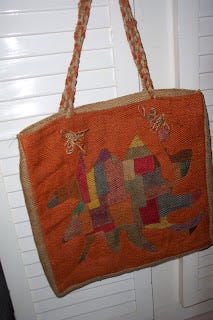Plastic Free July is a global campaign helping millions of people to become part of the solution to plastic pollution – so we can have cleaner streets, oceans and communities.
Plastic waste is unsightly and can harm wildlife and human health, from animals swallowing or getting entangled in plastics to rivers becoming floating masses of plastic to microplastics in human food.
According to Clean Hub, the campaign to clean up plastic pollution from our oceans: “Every minute, the equivalent of one garbage truck of plastic is dumped into our ocean.”
I have always tried to reduce my use of single use plastics, such as grocery product bags and carrier bags and I try to avoid products that are packaged in plastic, though sometimes it can seem almost impossible (and it depends on where you’re able to shop). DRNatureGirl has a good article here about alternatives to plastic for wrapping leftovers:
There are solutions, such as cloth tote bags (I was given the one below as a gift, many years ago).
These are not entirely problem free, though, which makes reducing plastic pollution even more difficult. Cloth tote bags and paper bags actually take more energy to make and transport than do plastic carrier bags. So rather than picking up cloth bags as souvenirs (I’m astonished how many conservation charities still distribute free cloth tote bags to new members or at events), I have just a few reusable bags and use them all the time. For example, I have one cloth bag I use only for taking out the recycling and a couple that I use for shopping. Rather than using produce bags when out shopping I have a couple of cloth produce bags (which I wash regularly). Some items I buy totally loose (it helps that I buy most of my vegetables in shops that are themselves committed to reducing waste and don’t automatically pack my produce into plastic once I get to the till).
Many products tend to be packaged in plastic. One way to avoid this is to refill containers. The New Leaf Co-operative in Edinburgh is my favourite place to get refills on everything from lentils to washing up liquid, they also sell items such as deodorants and lip balms packaged in strong cardboard tubes (these work surprisingly well). I also shop in the two branches of Real Foods in the city, which have a great range of ecofriendly products, most of which aren’t packaged in plastic, Real Foods also offer a refillery for cleaning materials, but not for dry goods. There are a couple of other eco-friendly shops in Edinburgh, which offer some refillery services, but several have recently gone out of business, probably showing that the cost of living crisis has defeated many people’s intentions to become more eco-friendly. This type of shop isn’t found everywhere though.
We also increasingly use and dispose of so-called ‘fast-tech’ items that are often manufactured using plastic. Some of these items are useful, like fans, while others are pointless (there was a year or two ago, a fashion for street sellers during Edinburgh’s festival period, to sell plastic guns that spray out bubbles, yes, seriously). We need to be more mindful about how we use and dispose of these items - there are safe and easy ways to recycle electronic items and even make money from them, you can read about some of them here.
On a larger scale, one of the uses of plastic that most annoys me is in tree planting. Most trees that are planted are protected with plastic sleeves that usually are not removed and end up scattering the area with plastic pollution. So I was delighted to read about woolen tree guards in the post below from Charlotte at Land Agent Life
Avoiding plastic use on the large scale, requires a lot more of this creative thinking!
If you want to do your bit, as well as cutting back on plastic use and recycling, you can help by:
taking part in litter picks (for example, if you’re in Britain, you could join the Great British Beach Clean-up in September or find out whether a local conservation organisation does litter picks - I volunteer with the Water of Leith Conservation Trust to pick litter most weeks)
joining the Marine Conservation Society;
contacting your political representatives to change laws around plastic packaging in your area.
What are your top tips for cutting down on plastic use?
What’s Happening?
Swift Awareness Week (28 June - 6 July) celebrates the most aerobatic of birds.
World Seabird Day is held on July 3rd, marking when the extinct Great Auk (Pinguinis impennis) was last seen in 1844.
I’ve Been Published
I’m happy to have a haiku included in this selection on Haiku Girl Summer.







Thanks very much Juliet and really interesting piece - some great practical suggestions for reducing our own plastic waste!
Congratulaions on being published, Juliet.
I remember some yearsd ago, a massive push by the government to reduce and eliminate the use of plastics while I was living in Korea. There so many of these small black plastic bags that you could find them everywhere.
They government really pushed and mostly succeeded in having people bring their own recycled and reusable bags for shopping.